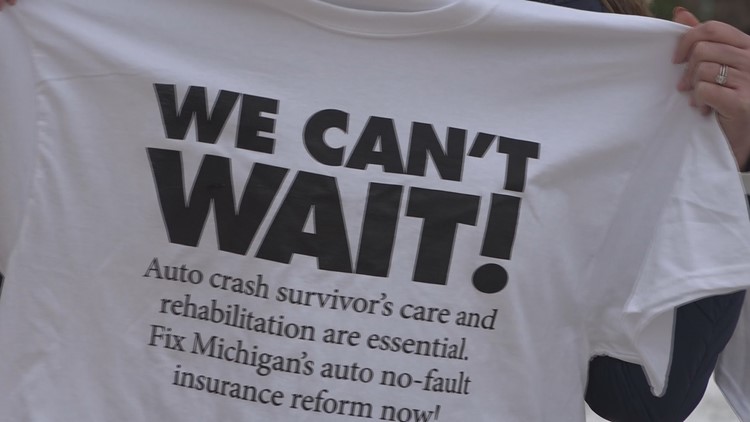LANSING, Mich. — In July of 2021, sweeping changes went into effect surrounding Michigan's No-Fault Automotive Insurance. A recent study commissioned by the Brain Injury Association of Michigan (BIAMI) found the 55-percent cap on reimbursement has lead to major issues for the people no-fault was meant to protect.
Supporters of the law change say they reign in overspending and lower auto insurance rates for drivers. Gov. Gretchen Whitmer has also instructed the Michigan Catastrophic Claims Association to refund every insured driver in the state.
But since the changes went into effect, the study found care providers are struggling to keep up with the reduced income. On top of that, thousands of catastrophically injured Michiganders are losing their care.
"It's important that the legislators know that its been seven months," said Melissa Springsteen. "And nothing has been done to help me or people in my situation."
Springsteen was injured in a car accident at 15 and now requires 24/7 care. She relied on her unlimited coverage to pay for medical expenses, including an in-home caregiver. The new changes have cut back the amount of time per week caregivers can spend to 56 hours, meaning her family had to pick up the slack.
"I have a family. I went to college. I got a job," she said, "28 years later they pulled the rug out not just from underneath my feet, but from underneath my wheelchair tires."
On Wednesday, she was surrounded by advocates and allies in similar positions at the state capital. The group #WeCantWait has lead the charge for amplifying the voices of the catastrophically injured. Dozens gathered to be face-to-face with their representatives and fight for a reform, or what they call a way to 'fix the fix.'
The group, along with other care providers have made numerous trips to the state's capital with the goal of reform. Wednesday's gathering was amplified by the study recently released by the BIAMI, showing the downward trend brain injury and spinal cord injury care providers have seen since the changes took effect.
According to that survey, since July 1, 2021, more than 3,000 jobs have been eliminated from care organizations. Prior to July 1, there were around 11,000 jobs between the 273 organizations surveyed, meaning in just a few months, more than a quarter of the workforce has been eliminated.
It goes on to show at least 20 organizations fully closing their doors due to a lack of funding, and 1,548 patients had to be discharged from care facilities. You can read the full survey by clicking here.
We've been following this issue since before the changes went into effect, and on both sides of the issue. For comprehensive past coverage, take a look at the related stories below.
►Make it easy to keep up to date with more stories like this. Download the 13 ON YOUR SIDE app now.
Have a news tip? Email news@13onyourside.com, visit our Facebook page or Twitter. Subscribe to our YouTube channel.



